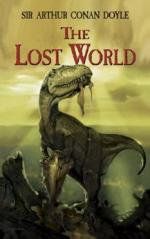There is a dry bituminous wood upon the plateau—a species of araucaria, according to our botanist—which is always used by the Indians for torches. Each of us picked up a faggot of this, and we made our way up weed-covered steps to the particular cave which was marked in the drawing. It was, as I had said, empty, save for a great number of enormous bats, which flapped round our heads as we advanced into it. As we had no desire to draw the attention of the Indians to our proceedings, we stumbled along in the dark until we had gone round several curves and penetrated a considerable distance into the cavern. Then, at last, we lit our torches. It was a beautiful dry tunnel with smooth gray walls covered with native symbols, a curved roof which arched over our heads, and white glistening sand beneath our feet. We hurried eagerly along it until, with a deep groan of bitter disappointment, we were brought to a halt. A sheer wall of rock had appeared before us, with no chink through which a mouse could have slipped. There was no escape for us there.
We stood with bitter hearts staring at this unexpected obstacle. It was not the result of any convulsion, as in the case of the ascending tunnel. The end wall was exactly like the side ones. It was, and had always been, a cul-de-sac.
“Never mind, my friends,” said the indomitable Challenger. “You have still my firm promise of a balloon.”
Summerlee groaned.
“Can we be in the wrong cave?” I suggested.
“No use, young fellah,” said Lord John, with his finger on the chart. “Seventeen from the right and second from the left. This is the cave sure enough.”
I looked at the mark to which his finger pointed, and I gave a sudden cry of joy.
“I believe I have it! Follow me! Follow me!”
I hurried back along the way we had come, my torch in my hand. “Here,” said I, pointing to some matches upon the ground, “is where we lit up.”
“Exactly.”
“Well, it is marked as a forked cave, and in the darkness we passed the fork before the torches were lit. On the right side as we go out we should find the longer arm.”
It was as I had said. We had not gone thirty yards before a great black opening loomed in the wall. We turned into it to find that we were in a much larger passage than before. Along it we hurried in breathless impatience for many hundreds of yards. Then, suddenly, in the black darkness of the arch in front of us we saw a gleam of dark red light. We stared in amazement. A sheet of steady flame seemed to cross the passage and to bar our way. We hastened towards it. No sound, no heat, no movement came from it, but still the great luminous curtain glowed before us, silvering all the cave and turning the sand to powdered jewels, until as we drew closer it discovered a circular edge.
“The moon, by George!” cried Lord John. “We are through, boys! We are through!”




